
News |
- Hope for Progress on Climate Change
- Pipeline Violates Lubicon Human Rights
- Grade: Canada's Poor Environmental Performance
- Manitoba Launches Green Registry
- Ecuador Constitution Recognizes Ecosystem Rights
- Water Quality Report Points to Nutrients
- Colorado Renewable Energy Growth
- Advice for the 44th US President
- Looming Ecological 'Credit Crunch': WWF
- Oscar Lathlin, Manitoba Cabinet Minister, Dies
- Wind Energy Top Choice: CANWEA
- Lawsuit for Killer Whales Protection
| Hope for Progress on Climate Change | 21 November 08 |
 President-elect Barack Obama spoke to not only the more than 600 climate change leaders from around the world on the eve of the Los Angeles Global Climate Summit, he spoke to the world in his 4-minute video address. President-elect Barack Obama spoke to not only the more than 600 climate change leaders from around the world on the eve of the Los Angeles Global Climate Summit, he spoke to the world in his 4-minute video address. The video and the commitments Barack Obama makes creates a new energy and provides hope the world can make progress on meeting challenges of climate change during the upcoming global negotiations next month. World leaders will gather in Poznan, Poland December 1st-12th, 2008 for annual UN meetings under the United Nations Framework Convention on Climate Changes and the Kyoto Protocol. President-Elect Obama repeated his previous promises to place a hard cap on greenhouse gas emissions and to establish emissions reductions targets, stating unequivocally the US will reduce emissions by 80 percent by 2050. He spoke directly to delegates who will be gathering in Poland, "Let me also say a special word to delegates from around the world who will gather in Poland next month: your work is vital to the planet," he said. "While I won't be President at the time of your meeting and while the United States has only one President at a time, I've asked members of Congress who are attending the conference as observers to report back to me on what they learn there." View November 18, 2008 News/Blog entry from Barack Obama's website and watch videoView YouTube video from US President-Elect Barack Obama, A New Chapter on Climate Change View November 19, 2008 New York Times article View November 19, 2008 ClimateWire article View November 19, 2008 Los Angeles Times article Sources: New York Times, YouTube, Office of the President-Elect |
|
 Print version Print version |
Top |
| Pipeline Violates Lubicon Human Rights | 19 November 08 |
|
TransCanada Pipelines received approval October 10, 2008 from Alberta Utilities Commission to build a pipeline through Lubicon territory without consent. The Alberta government has also approved over 2000 oil and gas wells within their ancestral lands without their consent or any benefit. The Lubicon Cree of northern Alberta never surrendered rights to their lands, as they were overlooked during treaty negotiations in the 1880's. Amnesty International has now joined Lubicon to demand consultation and recognition of their land rights. The United Nations has urged Canada to reach a settlement with the Lubicon and ensure they are consulted "before granting licences for economic exploration of the disputed land." The UN Human Rights Committed (UNHRC) concluded that development in their traditional territory is a violation to their fundamental human rights. View November 4, 2008 The Green Pages articleView October 23, 2008 Vue Weekly article Visit Friends of the Lubicon View Amnesty International Canada Campaign View Amnesty International Canada Take Action for Lubicon View October 16, 2008 Edmonton Journal article Source: Green Pages, Vue Weekly, Friends of the Lubicon, Amnesty International, Edmonton Journal |
|
 Print version Print version |
Top |
| Grade: Canada's Poor Environmental Performance | 19 November 08 |
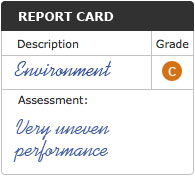 Canada's environmental record rates among the worst of industrialized nations. Recent report from the Conference Board of Canada placed Canada 15th of 17 peers. The top ranking OECD (Organization for Economic Co-operation and Development) nations were Sweden, Finland and Norway. Canada's environmental record rates among the worst of industrialized nations. Recent report from the Conference Board of Canada placed Canada 15th of 17 peers. The top ranking OECD (Organization for Economic Co-operation and Development) nations were Sweden, Finland and Norway.The Report Card on Canada: How Canada Performs: Environment-Details and Analysis gave Canada a "D" grade on six indicators including waste generation, water usage, and greenhouse gas emissions. Canada received its only "A" grade for use of forest resources. "Without serious attention to environmental sustainability, Canada puts its society and its quality of life at risk," the independent research organization said in the report. Canada stands at the bottom of the pack, only ahead of Australia and the United States in the ranking with an overall C grade, reflecting a poor performance. Canada's GHG emissions per capita increased by almost one third between 1990 and 2006 and per capita water usage is second highest of all ranked. View A Report Card on CanadaView November 3, 2008 Reuters article View November 3, 2008 Conference Board of Canada Video: Poor Results in Water, Waste and Greenhouse Gases Worsen Canada's Environmental Ranking View November 10, 2008 Reuters article View November 14, 2008 Caledon Enterprise article Sources: Conference Board of Canada, Reuters, Market Watch, Caledon Enterprise |
|
 Print version Print version |
Top |
| Manitoba Launches Green Registry | 14 November 08 |
 The Government of Manitoba launched GreenRegistry.org October 30, 2008. The Government of Manitoba launched GreenRegistry.org October 30, 2008.The Green Registry is a website that provides organizations, companies, families and individuals with information, guidance, and tools to help Manitobans "understand the sources of greenhouse gas (GHG) emissions and how to measure and reduce these emissions". There are four main sections to the Green Registry: The Green Registry does not provide new or detailed information about Manitoba's GHG on a sectoral basis and the website does not include a carbon or GHG inventory for the province. At this time no baseline data is provided. "Manitoba is to be commended for taking this step. We are sure Manitobans will respond! We also urge Manitoba to move to carbon and emissions threshold inventories, baseline data, transparency, and strong incentives for meeting and exceeding Kyoto targets. Our government has signed onto tough reductions targets. It is time to get ready for reporting on much lower thresholds than Canada's GHG Inventory," said Gaile Whelan Enns. View October 30, 2008 Government of Manitoba press releaseVisit Manitoba's Green Registry Source: Government of Manitoba |
|
 Print version Print version |
Top |
| Ecuador Constitution Recognizes Ecosystem Rights | 13 November 08 |
 On September 28, 2008, the people of Ecuador voted for a new constitution that is first in the world to recognize legally enforceable Rights of Nature, or ecosystem rights. On September 28, 2008, the people of Ecuador voted for a new constitution that is first in the world to recognize legally enforceable Rights of Nature, or ecosystem rights.Article 1 of the new "Rights for Nature" chapter of the Ecuador constitution gives nature the right to "exist, persist, maintain and regenerate its vital cycles, structure, functions and its processes in evolution". The adoption of the constitution means Ecuador's new system of environmental protection is based on rights and communities, so elected officials and even individuals have legal standing to defend the rights of nature. Over the past year, US-based Community Environmental Legal Defense Fund assisted the Ecuadorian Constituent Assembly developing and drafting provisions that put ecosystem rights directly into the Ecuadorian constitution. Ecuador's constitutional referendum followed a July 7th vote by the 130-member Ecuador Constitutional Assembly that approved articles that recognize rights for nature and ecosystems. Nearly 70 percent of Ecuadorians voted in favour of the new charter. The new constitution also grants all citizens the right to water and universal healthcare, pensions, and free state-run education through the university level. View September 28, 2008 Community Environmental Legal Defense Fund press releaseView September 30, 2008 Christian Science Monitor article View August 8, 2008 Green Change article View September 2, 2008 Los Angeles Times article Sources: Community Environmental Legal Defense Fund, Christian Science Monitor, Green Change, Los Angeles Times |
|
 Print version Print version |
Top |
| Water Quality Report Points to Nutrients | 13 November 08 |
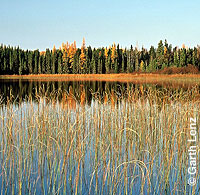 A recent study provides a report card on the health of Manitoba's Shell River watershed surface and ground water. Nutrient build-up is identified as the most serious water quality problem in the region. A recent study provides a report card on the health of Manitoba's Shell River watershed surface and ground water. Nutrient build-up is identified as the most serious water quality problem in the region.The Lake of the Prairies Conservation District (LPCD), a community based organization released the Shell River Watershed: State of the Watershed Report. The report provides resource management concerns and recommended actions for the watershed. The study is an important first step to an integrated watershed management plan to deliver land and water conservation programming. The LPCD works to preserve natural resources within the Shell River watershed, which straddles the Manitoba-Saskatchewan border in western Manitoba. View June 2008 Shell River Watershed: State of the Watershed Report (PDF)View October 28, 2008 Paths Less Travelled Blog article View Manitoba Water Stewardship - Lake of the Prairies Conservation District (LPCD) Sources: Lake of the Prairies Conservation District, Paths Less Travelled, Government of Manitoba |
|
 Print version Print version |
Top |
| Colorado Renewable Energy Growth | 13 November 08 |
 Xcel Energy of Colorado is replacing two coal-fired plants with 850 megawatts of wind power and one of the world's largest utility-scale solar power plants. The 200-megawatt solar plant uses concentrated solar technology to generate and store energy from the sun. Xcel Energy of Colorado is replacing two coal-fired plants with 850 megawatts of wind power and one of the world's largest utility-scale solar power plants. The 200-megawatt solar plant uses concentrated solar technology to generate and store energy from the sun.Wind and solar power are growing fast in Colorado. Wind capacity has quadrupled in the past 18 month and Xcel has become the largest provider of wind power in the US. Federal investment tax credits have helped to grow renewable energies. In 2004, Colorado passed state law mandating 10% of electricity sales come from renewable sources by 2015. Xcel Energy met the requirement eight years ahead of schedule so government doubled the target, to 20 percent by 2020. Colorado's aims to become a leader in clean, modern energy technology. Xcel Energy is a partner in the proposed Solar Technology Acceleration Centre, in Aurora, Colorado. It will be one of the world's largest solar test and evaluation facilities. View October 10, 2008 Forbes articleView August 20, 2008 Rocky Mountain News article View October 18, 2008 Denver Post article View August 18, 2008 Washington Post article View August 25, 2008 Solve Climate blog item Sources: Forbes, Denver Post, Rocky Mountain News, Washington Post, Solve Climate |
|
 Print version Print version |
Top |
| Advice for the 44th US President | 05 November 08 |
 As 44th President of the United States of America, Barack Obama will spend the first hundred days of his administration developing his new vision and agenda for the nation. Groups are urging him to appoint a cabinet-level science advisor by Inauguration Day. As 44th President of the United States of America, Barack Obama will spend the first hundred days of his administration developing his new vision and agenda for the nation. Groups are urging him to appoint a cabinet-level science advisor by Inauguration Day.The American Association for the Advancement of Science (AAAS) along with nearly 180 businesses, education and scientific organizations sent letters to both presidential candidates outlining the urgent need for a scientific and technical advisor. The groups argue scientific innovation and ingenuity are required to address energy security, climate change, health care, and U.S. economic competitiveness. In a separate initiative, experts were asked, "what should the next president do in his first 100 days to address the planet's most pressing problems". Visit the World Changing website, an online magazine for their advice on the environment, economy, and restoring America's role as a global leader. View October 31, 2008 AAAS Letters to Senators McCain & Obama re: Science and Technology Advice for the New AdministrationView October 29, 2008 World Changing article View October 31, 2008 New York Times Blog article View November 3, 2008 Chronicle of Higher Education article View Spiegel Online Obama coverage Sources: The American Association for the Advancement of Science, World Changing, New York Times, Chronicle of Higher Education |
|
 Print version Print version |
Top |
| Looming Ecological 'Credit Crunch': WWF | 05 November 08 |
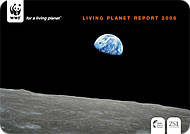 Over consumption of "natural capital" is leading the Earth towards an ecological credit crisis. A new report says we are exceeding the Earth's carrying capacity by about 30 percent, with clear economic impacts on food, water and energy. Over consumption of "natural capital" is leading the Earth towards an ecological credit crisis. A new report says we are exceeding the Earth's carrying capacity by about 30 percent, with clear economic impacts on food, water and energy.The Living Planet Report 2008 is a bi-annual study that measures the ecological footprint of human demand on natural resources and assesses the Earth's ability to remain a "living planet". The report is a joint effort by the World Wildlife Fund (WWF), the Zoological Society, and the Global Footprint Network. "If our demands on the planet continue to increase at the same rate, by the mid-2030s we would need the equivalent of two planets to maintain our lifestyles," said WWF International Director-General James Leape. USA and China have the largest national footprints, together accounting for about 40 percent of the global footprint. The water footprint is a new addition to the report, which examines the hidden economic cost of water consumption. Canada has the 12th largest water footprint with the average Canadian consuming more than two million liters of water annually. View WWF Living Planet Report 2008 (PDF)View WWF - Canada press release Visit WWF - International View October 29, 2008 CBC article View October 28, 2008 AFP article View October 30, 2008 Forbes article View October 29, 2008 CTV article View October 28, 2008 Globe and Mail article Sources: WWF, CBC, AFP, Forbes, CTV, News 24 |
|
 Print version Print version |
Top |
| Oscar Lathlin, Manitoba Cabinet Minister, Dies | 05 November 08 |
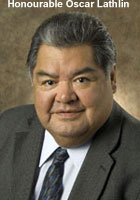 Manitoba Aboriginal and Northern Affairs Minister Oscar Lathlin (61) died the weekend of November 1st, after falling ill suddenly at his cottage near The Pas, Manitoba. The cabinet minister and longtime member of the Manitoba Legislature worked constantly to improve the lives of people in the north. Manitoba Aboriginal and Northern Affairs Minister Oscar Lathlin (61) died the weekend of November 1st, after falling ill suddenly at his cottage near The Pas, Manitoba. The cabinet minister and longtime member of the Manitoba Legislature worked constantly to improve the lives of people in the north.From humble beginnings working trap lines near The Pas, Lathlin was first elected as MLA for the Pas in 1990. He served in Cabinet from 1999 to his death. "Oscar was a champion of anything that had to do with First Nation education or northern education," said Attorney General Dave Chomiak. "It was his belief that education and economic development were absolutely pivotal to the north, and that's something he never gave up on." "I knew Oscar Lathlin from the time he first ran for election. An advocate for northern communities, he carried the double load of being a First Nation MLA. He will be missed," said Gaile Whelan Enns. Lathlin had a long history of asthma and respiratory trouble. He was born and raised on Opaskwayak Cree Nation near The Pas and served as Chief of Opaskwayak in the 1980's. View November 3, 2008 Winnipeg Sun articleView November 2, 2008 Canadian Press article View November 2, 2008 Canada.com article View November 2, 2008 CTV article Sources: Winnipeg Sun, The Canadian Press, Canada.com, CTV |
|
 Print version Print version |
Top |
| Wind Energy Top Choice: CANWEA | 05 November 08 |
 Wind energy was the top pick by Canadians in a national survey on renewable energy development. The Canadian Wind Energy Association (CanWEA) aims to have 20 percent of national energy supplies sourced from wind by 2025. Wind energy was the top pick by Canadians in a national survey on renewable energy development. The Canadian Wind Energy Association (CanWEA) aims to have 20 percent of national energy supplies sourced from wind by 2025.CanWEA's Wind Power Survey, undertaken by The Strategic Council, asked Canadians their opinion on energy sources and action needed by industry and government. A sizeable 67 percent of Canadians felt that all new demand for energy should be met with renewable energy sources. Wind energy was the first choice by 29 percent of Canadians and 32 percent felt it would be their second choice. CanWEA's has released its strategic plan - Wind Vision 2025: Powering Canada's Future. It outlines how wind energy can satisfy growing energy demands and reduce Canada's annual greenhouse gas emissions by 17 Megatonnes. "Here in Manitoba we have a confusing situation. Several environmental licenses have been issued to wind projects that are not going forward. First Nation communities interested in wind projects lack support, and Manitoba Hydro appears to be limiting the potential for wind energy in Manitoba," said Gaile Whelan Enns of Manitoba Wildlands. View CanWEA - Wind Power Survey - October 2008 (PDF)View CanWEA - Wind Vision 2025 - Powering Canada's Future (PDF) View October 20, 2008 NewsWire article View October 30, 2008 Renewable Energy World article View October 23, 2008 Energy Efficiency News article Sources: Canadian Wind Energy Association, NewsWire, Renewable Energy World, Energy Efficiency News |
|
 Print version Print version |
Top |
| Lawsuit for Killer Whales Protection | 05 November 08 |
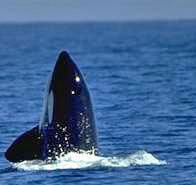 Ecojustice has filed a lawsuit against Canada's Department of Fisheries and Oceans (DFO) on behalf of six environmental groups who claims DFO has failed to legally protect critical habitat of endangered killer whales off the British Columbia coast. Ecojustice has filed a lawsuit against Canada's Department of Fisheries and Oceans (DFO) on behalf of six environmental groups who claims DFO has failed to legally protect critical habitat of endangered killer whales off the British Columbia coast. On September 10, 2008, DFO declined to issue an Order under Species at Risk Act (SARA) to protect their critical habitat from destruction. DFO contended that other laws and regulations already protect killer whales. "DFO's decision not to protect critical habitat of Resident Killer Whale is symptomatic of the federal government's widespread failure to implement the Species at Risk Act," said Gwen Barlee, policy director of The Wilderness Committee. The endangered Southern Resident Killer Whale has suffered a 20 percent decline between 1993 and 2003, with only about 80 whales remaining. The threatened Northern Resident Whales have dropped 7 percent in recent years with only 205 remaining. View October 8, 2008 Environmental Defence press releaseView October 8, 2008 Associated Press article View October 9, 2008 CBC article View October 14, 2008 BC Local News article View March 2008 Fisheries and Oceans Canada, Killer Whale Recovery Strategy (PDF) View October 8, 2008 Ecojustice Application to the Federal Court of Canada (PDF) View November 8, 2008 CTV article Sources: Environmental Defence, Associated Press, CBC, BC Local News |
|
 Print version Print version |
Top |


 RSS Feeds:
RSS Feeds: